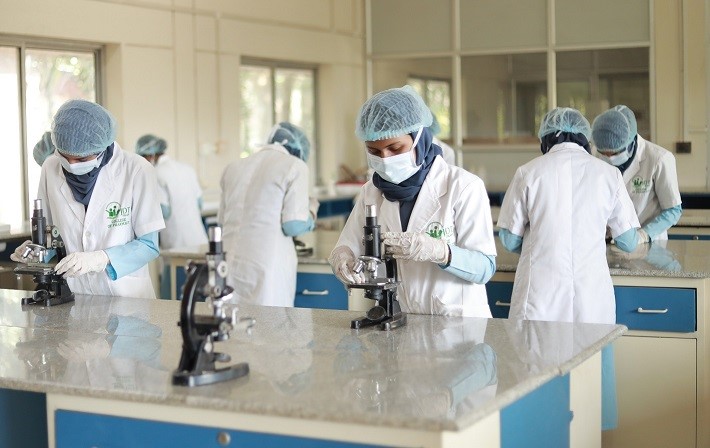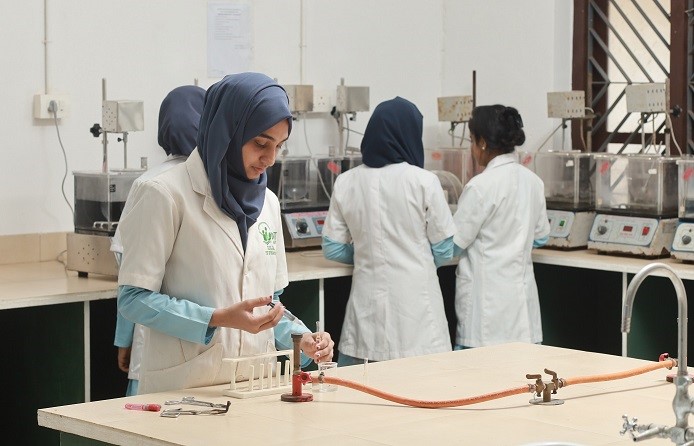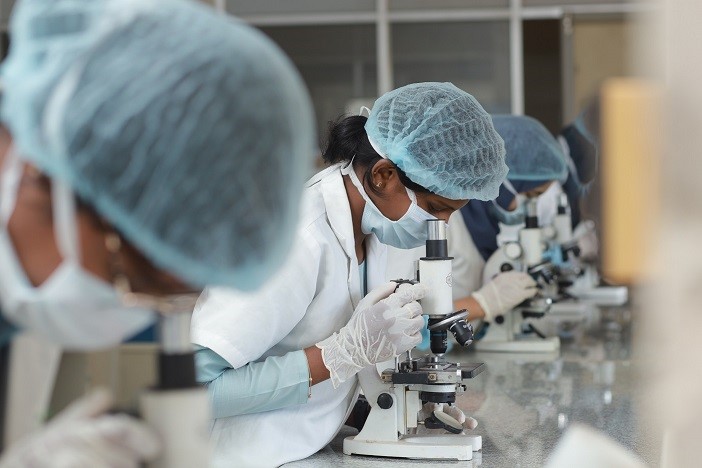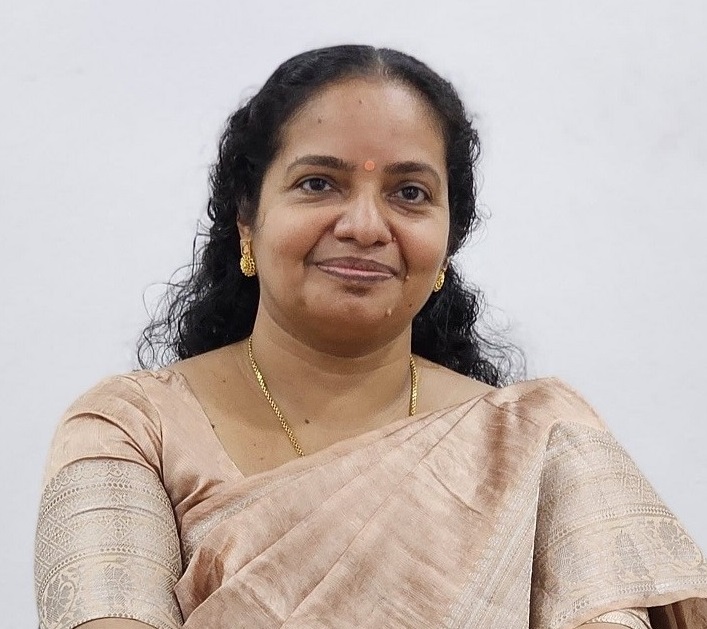Aspiring Pharmacists can pursue their passion for healthcare at JDT Islam College of Pharmacy through the Bachelor of Pharmacy (B. Pharm) program, open to 12th pass students, and the Master of Pharmacy (M. Pharm) program, which requires a B. Pharm degree for eligibility. With a focus on providing comprehensive knowledge and hands-on experience, the college is committed to molding skilled and dedicated professionals in the field of Pharmacy. As a leading center for Pharmacy education, JDT Islam College of Pharmacy is committed to nurturing specialists who can make a positive impact on the health and well-being of individuals, communities, and society as a whole.
Courses Offered
Undergraduate and Postgraduate Programs

D.PHARM
The minimum qualification for a registered Pharmacist is D.Pharm.
Candidates who have passed 10+2 with Physics and Chemistry subjects as
compulsory and Biology/ Mathematics as optional subjects are eligible to
seek admission. The two year program is followed by a mandatory 150 hours
practical training spread out over a minimum of three months. D.Pharm
holders can opt for careers in hospitals, wholesale and retail pharmacy and
pharmaceutical industry. Admissions are conducted to 50% seats by the
Government of Kerala through LBS Centre for Science & Technology. The
remaining 50% admissions are conducted by the management on the basis
of merit.

B.PHARM
Four year B.Pharm course opens doors to a multitude of careers from
drug discovery to dispensing. In the evolving healthcare scenario the role of
Pharmaceutical Sciences is on the rise. Candidates with a pass in 10+2 with
50% aggregate in Physics, Chemistry & Biology/Mathematics and 50%
separately in biology/mathematics is eligible to apply. 50% of the seats are
filled through Kerala Engineering Architecture Medical (KEAM) Entrance
examination. The remaining 50% is filled by the management based on merit
by way of online application process. B.Pharm course follows Semester
System of examination.

M.PHARM
M.Pharm (Pharmacy Practice) course is open to B.Pharm graduates from
institutions approved by Pharmacy Council of India, New Delhi with 55%
aggregate marks. 50% of seats are filled by the Commissioner of Entrance
Examinations and the balance 50% is filled by the management based on
merit through online application process. The course can lead to careers in
hospitals, industry, research and academics. The escalation is communicable
and life – style diseases emphasizes the role of Pharmacy Practice in
healthcare systems.

Departments
PHARMACEUTICS
Pharmaceutics is the overall process of developing a new chemical entity into an approved therapy that is safe and effective in treating or preventing disease. It is a complex process requiring multiple scientific, medical, legal, commercial, and regulatory expertise. On average, it typically takes at least ten years for a new drug to complete the process from initial discovery to the retail marketplace, with clinical trials alone taking six to seven years on average.

Dr.ANJANA JOHN
Principal

Dr.IBRAHIM AFSAL.V.T
Vice Principal

SAJISHA RAJI
Associate Professor

ASHIF ANJUKANDAN
Associate Professor

ADITHI VISWANATH
Associate Professor

SAHILA SHERI P K
Assistant Professor

NIHALA ABDULALI N K
Assistant Professor

AJISHA V
Assistant Professor

HANNA FATHIMA.P
Assistant Professor

HIBA K
Assistant Professor

KAVITHA.C.V
Lecturer
PHARMACOLOGY
Pharmacology is the scientific study of the effects of drugs and chemicals on living organisms where a drug can be broadly defined as any chemical substance, natural or synthetic, which affects a biological system. Pharmacology may involve how organisms handle drugs, identification and validation of new targets for drug action, and the design and development of new drugs to prevent, treat and cure disease. Pharmacology research is also a critical component in the development of modern 'personalized medicine'

Dr. NAGARAJA PERUMAL GOVINDASAMY
Professor cum HOD

RUBY.R
Associate Professor

PURNIMA.M.K
Associate Professor

DHANYA P
Assistant Professor

ADHYA DAS
Assistant Professor

AFEEFA C M
Assistant Professor

DIMPLE.T
Lecturer
PHARMACEUTICAL CHEMISTRY
Pharmaceutical chemistry deals with the discovery, desin, development and both pharmacological and analytical characterisation of drug substances. Medicinal chemists are indispensible in the preclinical stages of drug development, and again as pharmaceutical chemists in drug quality control. The chapter describes stages of drug development (hit to lead to preclinical candidate to drug substance), followed by a summary of the phases of drug activity relating to a drug#s formulation, pharmacokinetics and pharmacodynamics. Finally, classification systems for marketed drug substances are presented, with an emphasis on the classification by molecular target.

Dr.SARIF NIROUSH
Professor

DESNA.D.S
Associate Professor

VINEETHA.C.M
Associate Professor

NOUSHAD.K.T
Associate Professor

BINCY.B.C
Assistant Professor

BIJULA.K
Assistant Professor

ATHULYA K A
Assistant Professor

NEETHU DASAN M
Assistant Professor

THARA RAJAN
Lecturer
PHARMACY PRACTICE
The primary mission of the pharmacy profession is to have a positive impact on the provision of public health service by ensuring the safe and effective use of medications. There are various facets to this mission, including the preparation and distribution of medications, as well as contact with patients and other members of the healthcare team.

Dr. RENJITH.J
Professor

SHAFEENA.T
Associate Professor

ATHIRA.P
Associate Professor

SABREENA.P
Associate Professor

MINNU GEORGE
Assistant Professor

RAMYA M
Assistant Professor
PHARMACOGNOSY
Pharmacognosy is “to acquire knowledge of drugs.” In the past, most of the drugs were derived from herbs and conventional pharmacognostical studies were focused on the systematic study of medicinal plants and medicines derived from plants. However, the interests and scope of Pharmacognosy were gradually expanded by incorporating applied domains of botany, chemistry, biology and pharmaceutical science.

Dr. AISWARYA.G
Professor

ATHIRA.A
Associate Professor
PHARMACEUTICAL ANALYSIS
Pharmaceutical Analysis is a branch of practical chemistry that involves a series of process for identification, determination, quantification and purification of a substance, separation of the components of a solution or mixture, or determination of structure of chemical compounds.

